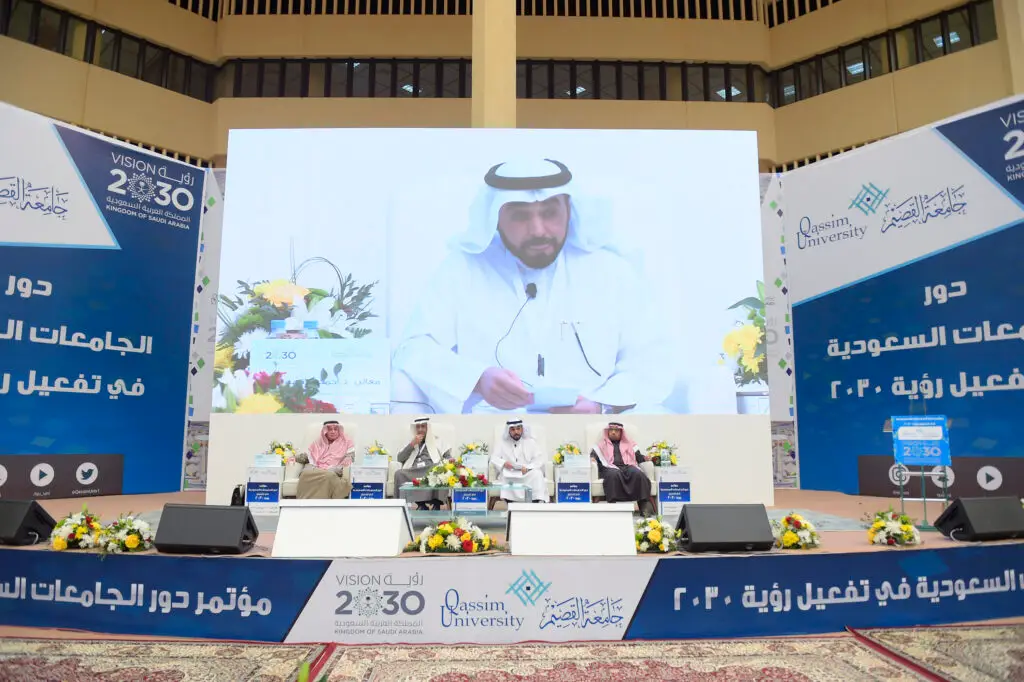During the first symposium at Qassim University
Governor of Technical and Vocational Training Corporation: Vision 2030 provides professional cadres to build the nation...Director of the Electronic University We are witnessing a remarkable growth in education...Dr. Al-Ohali The Ministry seeks to provide the needs and requirements of the labor market in the next stage
Media and Communication Center:
The scientific seminars dedicated to the conference "The Role of Saudi Universities in Activating Vision 2030" kicked off" The first seminar was held under the title "Educational Pathways in Universities and Vision 2030", chaired by His Excellency Dr. Ahmed Al-Fahid, Governor of the Technical and Vocational Training Corporation, with the participation of Dr. Abdullah Al-Mousa, Acting President of the Saudi Electronic University, Dr. Mohammed bin Abdulaziz Al-Ohali, Undersecretary of the Ministry of Education for Educational Affairs, and Dr. Abdul Mohsen Al-Dawood, Professor at Imam Muhammad bin Saud Islamic University..
The Chairman of the session, His Excellency Dr. Ahmed Al-Fahid, Governor of the Technical and Vocational Training Corporation, emphasized the importance of the role of universities in educational institutions in activating Vision 2030, as they are responsible for the future, raising new generations, and providing the professional and scientific cadres required to build the country and achieve progress and prosperity.
Dr. Abdullah Almoosa, Acting Director of the Saudi Electronic University, presented a scientific paper entitled "E-learning is a strategic choice to achieve the national vision", in which he reviewed the role of e-learning in recent years in the educational sector and its alignment with the developments and technology that we live in today, indicating that e-learning is an opportunity to apply ICT policies in universities that are able to support their organizational adaptation to digital requirements and provide continuous education to students that would contribute to better developing their skills, especially the skills associated with learning.
Mr. Almoosa talked about the experience of the Saudi Electronic University, which takes the student as a strategic partner, by relying on a blended education policy that combines the two systems of distance education and face-to-face attendance. He explained the technical components, e-learning platforms and human cadres owned by the university, and presented a number of graphs in the admission rates during the past years.
He also emphasized that education plays an important role in sustaining economic and productive growth by relying on investment in and use of ICT, noting that this is due to its direct relationship to the innovation processes of knowledge-building industries, and its importance in enabling employees in all economic sectors to effectively use digital technologies, as well as developing the capabilities of individuals to manage, transfer and use knowledge productively.
Almoosa pointed out that the recent period has witnessed a remarkable growth in the trend of students towards e-learning, explaining that despite the novelty of the Saudi Electronic University, which has not been established for more than five years, the percentages of high school students who prefer to enroll in it prove that the future is heading towards increased reliance on it, as the percentage of students admitted to the university in the first year was 2.18 % of high school graduates, but this year it increased to more than 53%, as the electronic university has become the number one university in the choices of students who have obtained a high school diploma in the
He also explained that e-learning is characterized by its lower costs than regular education, as it saves time and effort, as the student can receive his education anywhere and anytime without being bound by lecture dates, scheduling system, and quality assurance in the e-learning system is easier, faster, and yields greater fruits compared to its application in other universities.
Dr. Mohammed bin Abdulaziz Al-Ohali, Undersecretary of the Ministry of Education for Educational Affairs, stressed that talking about the role of Saudi universities in achieving Vision 2030 has come at the right time, when all educational authorities must play their role in achieving the ambitious future vision of the Kingdom in 2030, pointing out that the Ministry of Education has prepared many ideas and visions to develop the scientific and research process in the Kingdom, and many initiatives are still in the process of study and continuous development.
Al-Ohali explained that the ministry seeks to provide the needs and requirements of the labor market in the next stage of the required professions and scientifically and practically qualified cadres by developing its educational services at all stages to ensure the desired quality of the educational process, stressing that the ministry sets its future plans according to the expected numbers of male and female students.
Dr. Abdul Mohsen Al-Dawood, a professor at Imam Muhammad bin Saud Islamic University, presented a working paper on the relationship of universities to activate Vision 2030, stressing that the vision was built on expansion, quality, excellence and absorption, and this is what universities achieve, calling for the need to support scientific research, develop the performance of faculty members and curricula, link scientific research programs and graduate studies in universities to the issues of the environment and society, in addition to the participation of universities in decision-making in society.
Al-Dawood also called for adding an international dimension to academic programs and scientific research to prepare graduates to work in a global market where the borders between countries have disappeared in terms of information.




